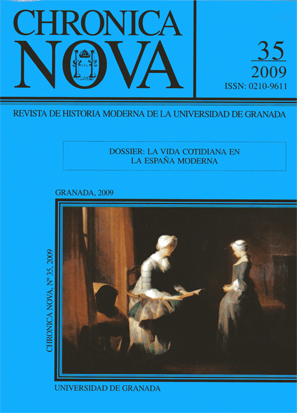Books, readers and private libraries in 18th century Spain
DOI:
https://doi.org/10.30827/cn.v0i35.1630Keywords:
Books, Reading, Libraries, Daily life, 18th centuryAbstract
During the Early Modern Age, the private possession of books and in some cases the possessionof actual libraries became more and more common. This would not have been possible withoutsome decisive changes, such as the advances in literacy, the diffusion of new reading practices andthe development of the edition and commercialisation of books. The 18th century was the period inwhich these changes were most significant.This article focuses on the analysis of these changes in our country, while it gives an accountof the main studies about private libraries referred to this century. It analyses the contents of someforty libraries studied until now. Amongst these are, in addition to the libraries of some of the mostrelevant figures of the Spanish Enlightenment, libraries of nobles, clergymen, high posts of theadministration, artists, bourgeois, science men, scholars, academicians and teachers.Downloads
Downloads
Published
How to Cite
Issue
Section
License
Nuestra revista se atiene a las recomendaciones para la implementación del Artículo 37 Difusión en Acceso Abierto de la Ley de la Ciencia, la Tecnología y la Innovación:
- Los/as autores/as cuyas contribuciones sean aceptadas para su publicación en esta revista conservarán el derecho no exclusivo de utilizar sus contribuciones con fines académicos, de investigación y educativos, incluyendo el auto-archivo o depósito de los artículos aceptados en repositorios institucionales o temáticos de acceso abierto de cualquier tipo en un plazo máximo de seis meses.
- Preferiblemente se permitirá el uso de la versión publicada de las contribuciones científicas, que estarán accesibles en abierto tan pronto como sea posible.
-
Que en caso de que el trabajo sea aprobado para su publicación, el/la autor/a autoriza de manera ilimitada en el tiempo a la entidad editora para que incluya dicho texto en Chronica Nova y pueda reproducirlo, editarlo, distribuirlo, exhibirlo y comunicarlo en el país y en el extranjero por medios impresos, electrónicos, CD, Internet o cualquier otro medio conocido o por conocer.






 ISSN-e: 2445-1908
ISSN-e: 2445-1908










